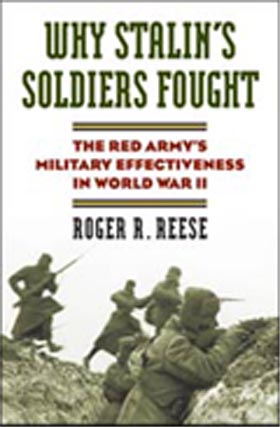Free Shipping on orders of 8 or more books.
Applies to US Shipments only.
Please note, I do not add new books to my website until
I actually have them in stock, as too many times in the past there have been the so called check's in the mail issues with problems from release
dates to shipping and so on. Many of the new titles you see around I will carry
and when I do have the book in stock they will be posted immediately.

WHY STALIN'S SOLDIERS FOUGHT THE RED ARMY'S MILITARY EFFECTIVENESS IN WWII
Book Type: C
Roger Reese,
Inept leadership, inefficient campaigning, and enormous losses would seem to spell military disaster. Yet despite these factors, the Soviet Union won its war against Nazi Germany thanks to what Roger Reese calls its “military effectiveness”: its ability to put troops in the field even after previous forces had been decimated. Reese probes the human dimension of the Red Army in World War II through a close analysis of soldiers’ experiences and attitudes concerning mobilization, motivation, and morale. In doing so, he illuminates the Soviets’ remarkable ability to recruit and retain soldiers, revealing why so many were willing to fight in the service of a repressive regime—and how that service was crucial to the army’s military effectiveness. He examines the various forms of voluntarism and motivations to serve—including the influences of patriotism and Soviet ideology—and shows that many fought simply out of loyalty to the idea of historic Russia and hatred for the invading Germans. He also considers the role of political officers within the ranks, the importance of commanders who could inspire their troops, the bonds of allegiance forged within small units, and persistent fears of Stalin’s secret police. Brimming with fresh insights, Reese’s study shows how the Red Army’s effectiveness in the Great Patriotic War was foreshadowed by its performance in the Winter War against Finland and offers the first direct comparison between the two, delving into specific issues such as casualties, tactics, leadership, morale, and surrender. Reese also presents a new analysis of Soviet troops captured during the early war years and how those captures tapped into Stalin’s paranoia over his troops’ loyalties. He provides a distinctive look at the motivations and experiences of Soviet women soldiers and their impact on the Red Army’s ability to wage war. Ultimately, Reese puts a human face on the often anonymous Soviet soldiers to show that their patriotism was real, even if not a direct endorsement of the Stalinist system, and had much to do with the Red Army’s ability to defeat the most powerful army the world had ever seen. 400 pp.

|




